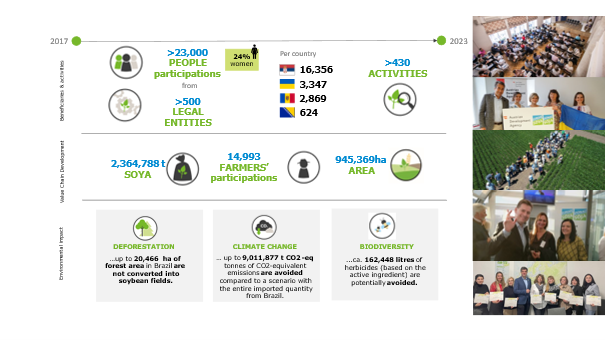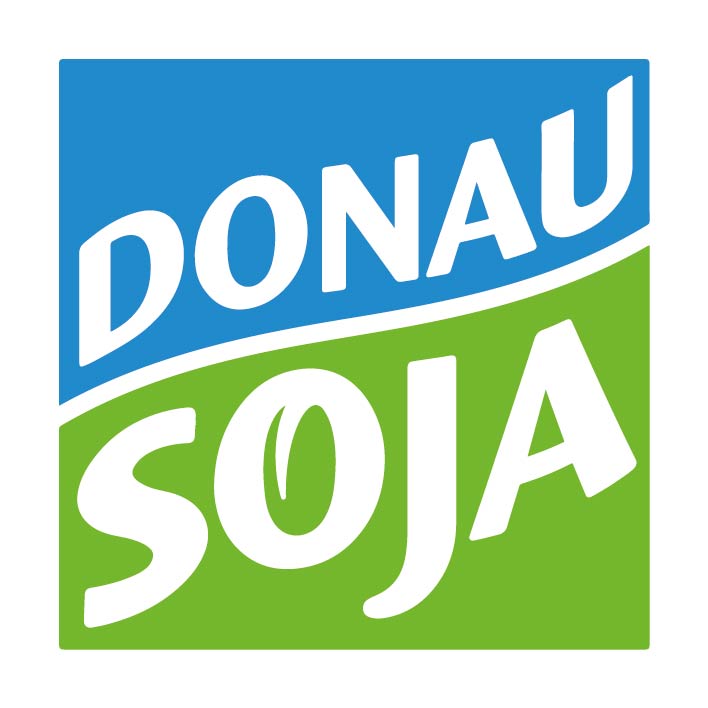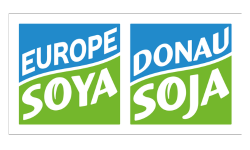Strategic Partnership Programme with Austrian Development Agency (ADA)
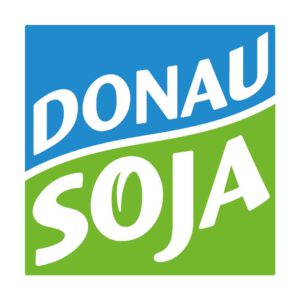
Donau Soja has had a Strategic Partnership with the Austrian Development Agency since 2017. This collaboration started from an inception phase conducted in 2015 and 2016, which highlighted the importance of the agri-food sector and identified areas of intervention that will bring positive change to the region. Recognised as a catalyst for development and a crucial link between non-EU and EU value chains, within the Strategic Partnership Donau Soja elevates sustainable, non-GM soya and crop production. Operating in Ukraine, Moldova, Serbia, and Bosnia and Herzegovina, the Programme empowers individuals and legal entities across the value chain, contributing to enhanced economic development and poverty reduction in local communities while supporting the United Nations’ Sustainable Development Goals.
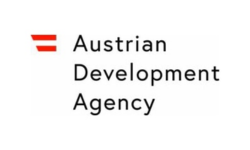
Since its foundation in 2004, the Austrian Development Agency (ADA) seeks to ensure that sustainable development works to the benefit of all people in Africa, Asia, South-Eastern and Eastern Europe. In these 20 years, the operational unit of Austrian Development Cooperation has achieved a great deal together with its partners – the living conditions of millions of people have improved substantially. Currently, however, the climate crisis, wars and armed conflicts are exacerbating poverty and hunger, forcing more and more people to leave everything behind and flee their homes. Despite everything, ADA’s vision of a good life for all remains unchanged. Bold and effective development cooperation is more important today than ever. Together with public institutions, civil society, universities and the private sector, ADA facilitated projects and programmes with a total volume of 815 million euros in 2023. Together with its partners, ADA is shaping the future.
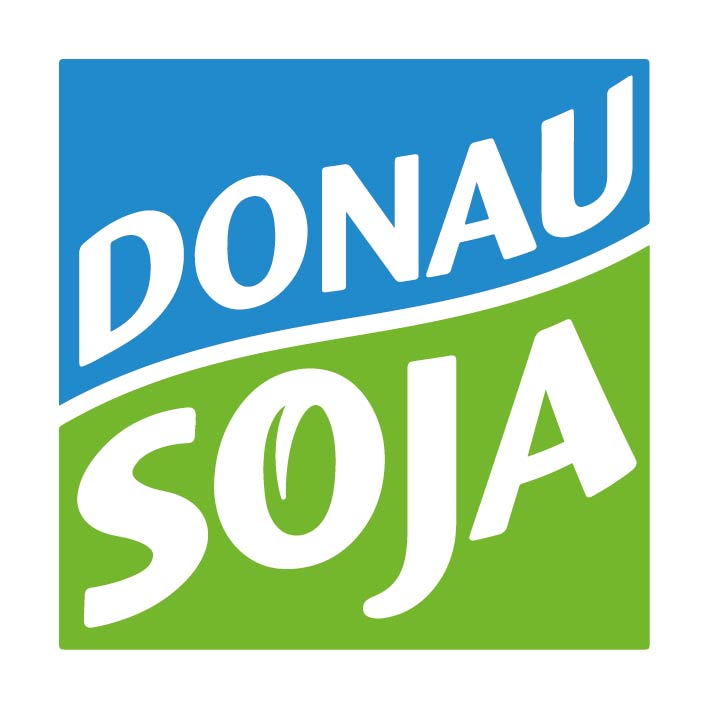
Donau Soja has had a Strategic Partnership with the Austrian Development Agency since 2017. This collaboration started from an inception phase conducted in 2015 and 2016, which highlighted the importance of the agri-food sector and identified areas of intervention that will bring positive change to the region. Recognised as a catalyst for development and a crucial link between non-EU and EU value chains, within the Strategic Partnership Donau Soja elevates sustainable, non-GM soya and crop production. Operating in Ukraine, Moldova, Serbia, and Bosnia and Herzegovina, the Programme empowers individuals and legal entities across the value chain, contributing to enhanced economic development and poverty reduction in local communities while supporting the United Nations’ Sustainable Development Goals.
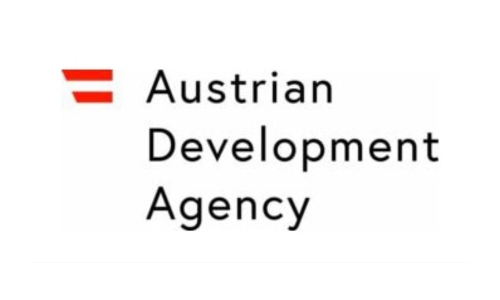
Since its foundation in 2004, the Austrian Development Agency (ADA) seeks to ensure that sustainable development works to the benefit of all people in Africa, Asia, South-Eastern and Eastern Europe. In these 20 years, the operational unit of Austrian Development Cooperation has achieved a great deal together with its partners – the living conditions of millions of people have improved substantially. Currently, however, the climate crisis, wars and armed conflicts are exacerbating poverty and hunger, forcing more and more people to leave everything behind and flee their homes. Despite everything, ADA’s vision of a good life for all remains unchanged. Bold and effective development cooperation is more important today than ever. Together with public institutions, civil society, universities and the private sector, ADA facilitated projects and programmes with a total volume of 815 million euros in 2023. Together with its partners, ADA is shaping the future.
Donau Soja and ADA – Strategic Partnership 2024-2029
Empowering Southeast and East European Agri-Food Sector through Sustainable, Traceable, and Non-GM Crop Production, Use, and Consumption
In April 2024, Donau Soja and the Austrian Development Agency (ADA) continued their cooperation within the Strategic Partnership Programme. The new Strategic Partnership II is called ” Empowering Southeast and East European Agri-Food Sector through Sustainable, Traceable, and Non-GM Crop Production, Use, and Consumption”. This new phase, will run from 2024 to 2029, apply the ‘inclusive market system development approach’ and will expand beyond soya to include other crops in rotations, with a focus on multi-crop strategies and digitalisation. With this Strategic Partnership, Donau Soja and ADA started a new 5-year, 11 million Euro program (50% grant). The program seeks to sustainably strengthen the actors in the agricultural and food sector in Serbia, Ukraine, Moldova and Bosnia and Herzegovina, by contributing to the development of the local private sector, poverty reduction, and environmental conservation. This is to be achieved through the increased cultivation of sustainable, traceable, European, and non-genetically modified crops.
Read more
Strategic Partnership 2024-2029
Empowering Southeast and East European Agri-Food Sector through Sustainable, Traceable, and Non-GM Crop Production, Use, and Consumption
The Strategic Partnership 2024-2029 aims to go beyond soybeans, leveraging the valuable experience gained in Strategic Partnership I that focused on fostering sustainable non-gm soybean value chains. By extending the positive impact and applying lessons learned from soybean value chain development to other crops, the initiative will achieve a broader impact on beneficiaries and provide multiple environmental benefits across Ukraine, Moldova, Serbia, and Bosnia and Herzegovina.
Alignment with Global and European Priorities
The implementation of the program is aligned with global and European priorities, contributing to Sustainable Development Goals (SDGs) 1, 2, 8, 9, 13, and 17, the European Commission’s Farm-to-Fork Strategy, and the European Green Deal. Beyond the borders of the target countries, consumers will also benefit from access to sustainably produced non-GM crops and products derived from them.
Background information and relevance
Food and agricultural systems are essential for sustaining human life, but they are also significant contributors to environmental degradation worldwide, affecting soil, water, climate, and biodiversity. Paradoxically, the livelihoods of agricultural and food producers heavily rely on these very resources. The negative impacts on climate, biodiversity, and soil pose not only a threat to global food production but also contribute to the increasing poverty among rural population, particularly in less developed countries, including four Programme target countries. Insufficient knowledge, information, and skills among stakeholders further intensify these challenges as they are not able to implement adaptation measures for unpredictable weather patterns, manage water availability, select and diversify crops, control pests and diseases, and adopt sustainable agricultural practices to cope with the rapidly changing climate. Furthermore, the extreme market instability characterised by significant fluctuations in input and commodity supply and demand presents a significant planning challenge. The widespread lack of digitalisation in the sector further compounds these issues. Addressing these challenges within the framework of the forthcoming Programme is crucial. By doing so, it will be possible to enhance the resilience of the agricultural sector, improve resource management, and support the adoption of sustainable practices, ultimately contributing to poverty reduction and fostering economic development, while protecting environment in the target countries. Although all four countries are different and have their own specific needs, the agriculture, food production and rural development sectors are essential for reducing poverty and strengthening their economic development.
The overall goal
The overall goal of the partnership is to increase sustainable, traceable, and non-GM production of crops by improving the supporting functions influencing rules and regulations, and by developing the Donau Soja standard and services system in 4 countries in Europe.
Programme Approach
Throughout the Programme, the initiative aims to give agency to crop producers and businesses by integrating them into sustainable, traceable, and non-GM value-added chains. The objective is to drive systematic change by encouraging a substantial number of businesses to adopt responsible and environmentally conscious practices. This approach will grant them better access to value-added markets and support their transition towards a sustainable future. By embracing these practices, businesses can strengthen their position in the market system, benefit from reliable market access, and seize diversified opportunities. The Strategic Partnership Program II will contribute to increase the share of sustainably managed land and thereby to reducing CO2 emissions. The new phase focuses on developing and implementing new standards, increasing the use of IT systems and digitalization, and supporting market actors in target countries to comply with new EU regulations on deforestation and environmental, social, and governance corporate responsibility.
Recognising the diversity and differences among countries is central to the implementation strategy, meaning that interventions are tailored to address the specific needs, challenges, and opportunities within each country. This country-specific approach allows the Programme to maximise the impact and effectiveness of Programme efforts, as it can effectively respond to the unique contexts and requirements of local communities. Therefore, the Programme adopts a unique approach by incorporating four local solutions, each customised to fit the specific circumstances of the target countries.
Commitment to Inclusivity
The Programme is firmly committed to opposing all forms of discrimination and promoting inclusivity and equal participation for individuals, regardless of their background, gender, ethnicity, or any other characteristic. It aims to create an environment that is inclusive and fair, where everyone can thrive and contribute to his/her success.
Components, Outcomes and Outputs of the Strategic Partnership
The Programme plans to empower the local agri-food sector and its stakeholders, including Donau Soja, through three areas of intervention (components) aimed at enhancing the position and the competitiveness of crop producers and other market system participants. The three components go hand in hand and are improving market system supporting functions of other stakeholders, influencing rules and regulations and developing standards and services. The three components are:
Component 1: Improving Supporting Functions
Component 1 aims to strengthen the position of crop producers and to provide reliable market access and diversified opportunities (outcome 1).
Component 2: Influencing Rules and Regulations
The goal here is to foster increased sustainable, non-GM, and traceable crop production through improved framework conditions and support (outcome 2).
Component 3: Developing Standards and Services System
This component targets the recognition of Donau Soja for creating a sustainable, traceable, non-GM crop sector. (outcome 3).
Project components and outputs
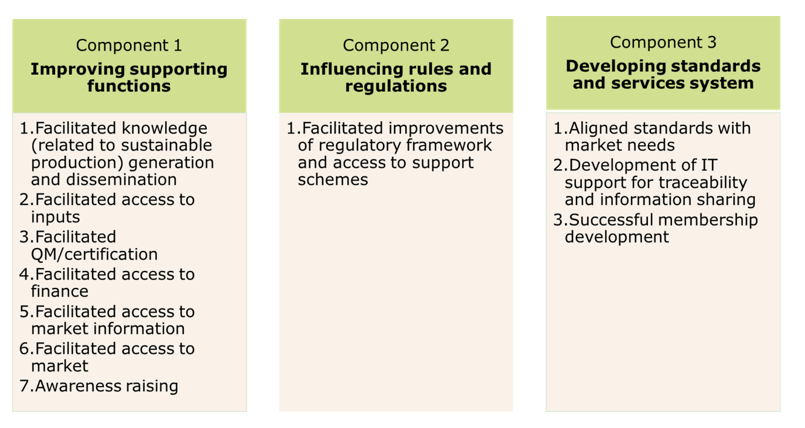
By focusing on these areas, the Programme aims to create an enabling environment that benefits the agri-food sector, facilitates market engagement, and promotes the adoption of sustainable practices, contributing to the overall empowerment and success of the involved stakeholders.
Donau Soja and ADA – Strategic Partnership 2017-2024
Building sustainable, inclusive, and well-functioning value chains for Non-GM soya and organic soya in Moldova, Ukraine, Serbia and Bosnia and Herzegovina
At the End of February 2024 Donau Soja and ADA (Austrian Development Agency) have successfully concluded a 7-year programme that has made significant developments in promoting non-genetically modified (non-GMO) and sustainable soybean production in Ukraine, Moldova, Serbia, and Bosnia and Herzegovina. With a budget of 9 million Euros, evenly split between ADA grant and Donau Soja’s own contribution, this programme has had a far-reaching impact on the soybean value chains in these countries.
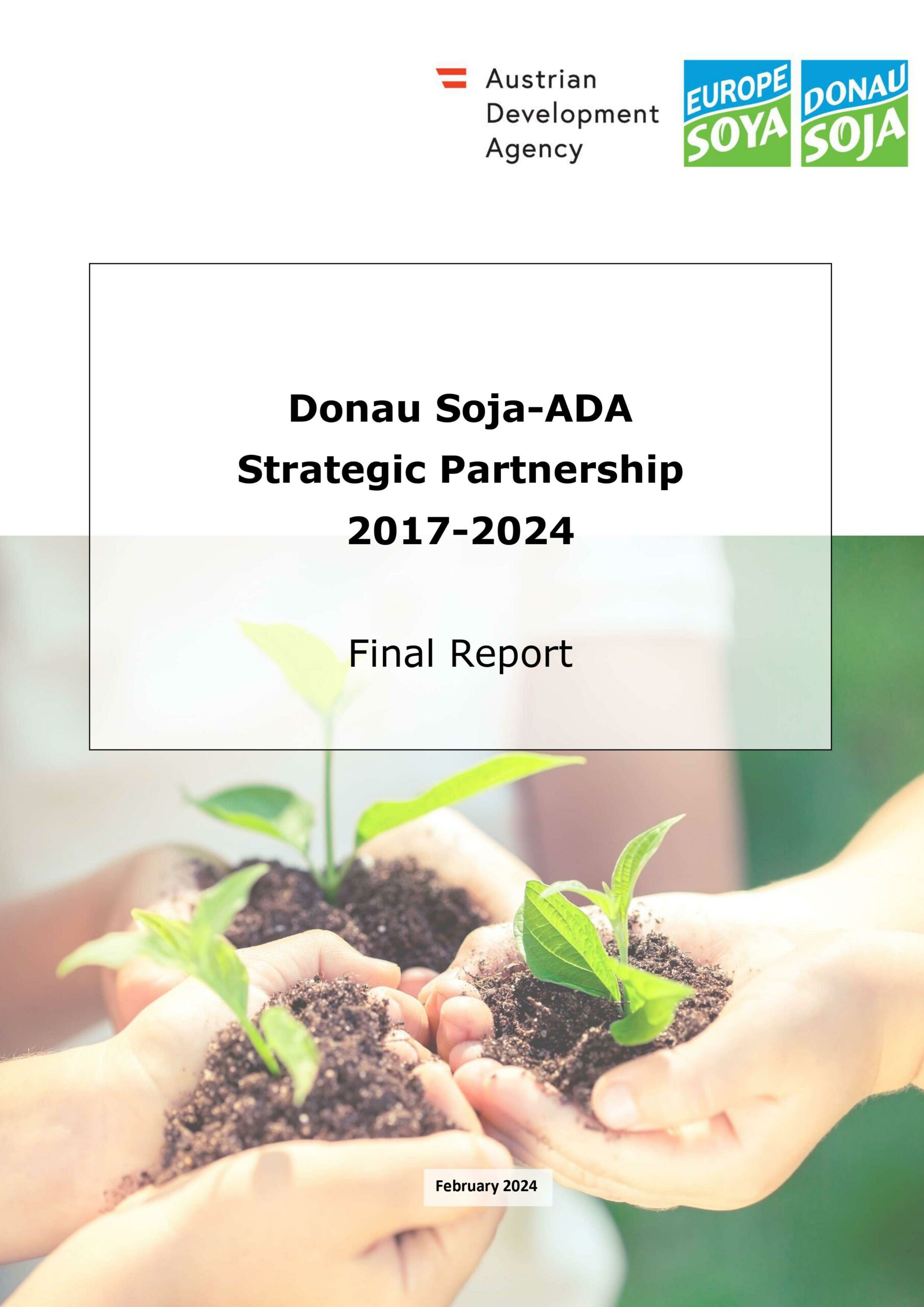
Read more
The Donau Soja- ADA Strategic Partnership, has been instrumental in advancing sustainable and non-GMO soybean production, establishing itself as a cornerstone for supply and value chain development production in Ukraine, Moldova, Serbia, and Bosnia and Herzegovina. As a result of this successful collaboration, over 2.3 million tonnes of sustainably produced non-GMO soybeans have been cultivated in the target countries. The Strategic Partnership has actively engaged over 23,000 participations of target country beneficiaries, with women making up 24% of the registered participation. Over 500 legal entities have been involved across numerous activities, providing valuable opportunities and empowering individuals at every level of the soybean value chain. The 2.3 million tonnes were produced on almost 1 million hectares of sustainably managed land and involvement of more than 14,000 farmers and 160 certified collectors and processors. Within the Strategic Partnership Programme period 2017-2021, area under soybeans in Serbia increased for 18%, in Bosnia and Herzegovina for 40% and yield in Ukraine increased for 34%. We believe that activities of our programme impacted this great developments. This has not only enhanced economic development but has also contributed to poverty reduction in local communities.
Beyond value chain development and economic impact, these remarkable achievements in sustainable soybean production have had significant environmental benefits as well. The production of 2.3 million tonnes of sustainably produced soybeans, resulted in the reduction of greenhouse gas (GHG) emissions by up to 9 million tonnes of Carbon Dioxide (CO₂)-eq compared to a scenario where the total volume is imported from Brazil. Additionally, it has helped in avoiding forest loss and decreasing herbicide usage.
Our program was aligned with several Sustainable Development Goals (SDGs). Our activities have contributed to SDGs 1 (No Poverty), 2 (Zero Hunger), 4 (Quality Education), 5 (Gender Equality), 8 (Decent Work and Economic Growth), 9 (Industry, Innovation and Infrastructure), 12 (Responsible Consumption and Production), 13 (Climate Action), 15 (Life on Land), and 17 (Partnerships for the Goals).
Presented numbers demonstrate the remarkable progress we have made in promoting non-GMO and sustainable soybean production in Ukraine, Moldova, Serbia, and Bosnia and Herzegovina.
We extend our sincere gratitude to ADA for their invaluable support and their visionary recognition of the Donau Soja Organisation as a catalyst for development and a vital bridge between the non-EU and EU value chains. We also express our appreciation to all the individuals and entities that have actively participated in this program. Together, we have built a future that prioritizes sustainability, environmental protection, and economic growth.
